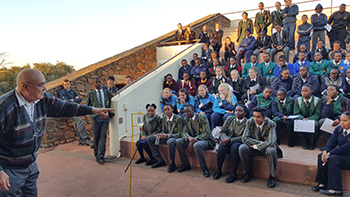Latest News Archive
Please select Category, Year, and then Month to display items
06 April 2018
Photo Rulanzen Martin
 From the left: Dr Thulisile Mphambukeli, leader of the BRICS research team that is exploring the political economy of water and food security, and her research partner, Dr Victor Okorie.
From the left: Dr Thulisile Mphambukeli, leader of the BRICS research team that is exploring the political economy of water and food security, and her research partner, Dr Victor Okorie.
A Brazil, Russia, India, China and South Africa (BRICS) delegation is to hold the 10th Annual BRICS Summit in the last week of May 2018 in Johannesburg. Dr Thulisile Mphambukeli, leader of the University of the Free State (UFS) research team alongside Dr Victor Okorie from the Department of Urban and Regional Planning, in collaboration with Prof Lere Amusan of North-West University, will ensure that water and food security is a prominent feature on the gathering’s agenda.
First, the project titled: “Exploring the political economy of water and food security nexus in BRICS and Africa” will debut at the National Institute for the Humanities and Social Sciences BRICS Think Tank Forum”.
According to Dr Mphambukeli, the key to water security is attitudinal change by means of education and conscientisation. This, she is adamant about, holds the potential to drive behavioural adjustments in the way society interacts with water.
Genetic and social approaches
Dr Okorie asserts that if strides towards reducing the demand for water were to be made, research efforts should be geared towards effecting changes at DNA level. Meaning we need to explore waterwise ways that enable crops and animals to thrive optimally.
The project also looks at social dimensions of water such as flushing a toilet. “Research activities on redesigning toilets, especially the urinal, where more than nine litres of water are used to flush less than one cubic centimetre of urine, are timely in the context of managing water and the food nexus crises,” said Dr Okorie.
Combining the genetic and social approaches would allow us to produce more with a smaller water footprint. This can be made possible by implementing precision agriculture which is about estimating and applying exact quantities of water and nutrients needed for the production of crops or the raising of livestock.
Paradigm shifting policies
Prof Amusan said the team intended to propose functional solutions that take the quality of water into consideration. Equitable production and distribution of water depends on endorsing policies of co-production between citizens, governments and the public sector. BRICS member states mutually consider water and food security as an issue of paramount significance, hence its feature on this prestigious summit’s agenda.
Science-for-the-Future host learners at Boyden Observatory
2017-06-15

Prof Jan Smit from the North-West University captivated
the learners with his presentation.
Photo: Supplied
In order to advance innovative Mathematics and Science teaching and learning, Science-for-the-Future from the University of the Free State’s (UFS) Faculty of Education hosted close to 100 Grade 10 Mathematics and Science achievers from 18 local secondary schools at the Boyden Observatory in Bloemfontein on 7 June 2017.
According to Dr Cobus van Breda, the Programme Director of Science-for-the-Future, the purpose of such events is also “to encourage learners to enter into science-related studies and careers, including the teaching profession, since we are in desperate need of good Maths and Science teachers in South Africa”.
The evening included contributions by two visiting National Science and Technology Forum (NSTF) award-winning presenters.
Prof Peter Dunsby from the Cosmology and Gravity Centre at the University of Cape Town gave the audience much to think about with his presentation titled ‘From the Big Bang to the Big Rip. Should we be afraid of the Dark Side of the Universe?’
Prof Jan Smit from the North-West University, on the other hand, explained basic Physics concepts using mostly household items. Mariette Erwee and Prof Matie Hoffman from the UFS concluded the evening with stargazing through the telescopes, as well as an open-air session on constellations.